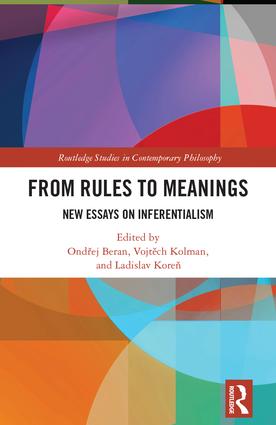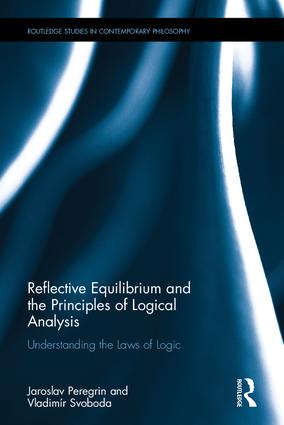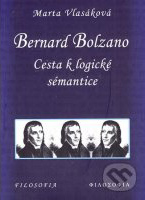 |
Jaroslav Peregrin:
Philosophy of Logical Systems
Routledge, 2019
This book addresses the hasty development of modern logic, especially its introducing and embracing various kinds of artificial languages and moving from the study of natural languages to that of artificial ones. This shift seemed extremely helpful and managed to elevate logic to a new level of rigor and clarity. However, the change that logic underwent in this way was in no way insignificant, and it is also far from an insignificant matter to determine to what extent the "new logic" only engaged new and more powerful instruments to answer the questions posed by the "old" one, and to what extent it replaced these questions with new ones. Hence, this movement has generated brand new kinds of philosophical problems that have still not been dealt with systematically. Philosophy of Logical Systems addresses these new kinds of philosophical problems that are intertwined with the development of modern logic. Jaroslav Peregrin analyzes the rationale behind the introduction of the artificial languages of logic; classifies the various tools which were adopted to build such languages; gives an overview of the various kinds of languages introduced in the course of modern logic and the motifs of their employment; discusses what can actually be achieved by relocating the problems of logic from natural language into them; and reaches certain conclusions with respect to the possibilities and limitations of this "formal turn" of logic..
|
 |
Ondřej Beran, Vojtěch Kolman & Ladislav Koreň (eds):
From Rules to Meanings: New Essays on Inferentialism
Routledge, 2018
Inferentialism is a philosophical approach premised on the claim that an item of language (or thought) acquires meaning (or content) in virtue of being embedded in an intricate set of social practices normatively governed by inferential rules. Inferentialism found its paradigmatic formulation in Robert Brandom’s landmark book Making it Explicit, and over the last two decades it has established itself as one of the leading research programs in the philosophy of language and the philosophy of logic. While Brandom’s version of inferentialism has received wide attention in the philosophical literature, thinkers friendly to inferentialism have proposed and developed new lines of inquiry that merit wider recognition and critical appraisal. From Rules to Meaning brings together new essays that systematically develop, compare, assess and critically react to some of the most pertinent recent trends in inferentialism. The book’s four thematic sections seek to apply inferentialism to a number of core issues, including the nature of meaning and content, reconstructing semantics, rule-oriented models and explanations of social practices and inferentialism’s historical influence and dialogue with other philosophical traditions. With contributions from a number of distinguished philosophers—including Robert Brandom and Jaroslav Peregrin—this volume is a major contribution to the philosophical literature on the foundations of logic and language.
|
 |
Jaroslav Peregrin & Marta Vlasáková:
Filosofie logiky
Filosofia, 2017
|
 |
Jaroslav Peregrin a Vladimír Svoboda:
Reflective Equilibrium and the Principles of Logical Analysis
Routledge, 2017
The book offers a comprehensive account of logic that addresses fundamental issues concerning the nature and foundations of the discipline. The authors claim that these foundations can not only be established without the need for strong metaphysical assumptions, but also without hypostasizing logical forms as specific entities. They present a systematic argument that the primary subject matter of logic is our linguistic interaction rather than our private reasoning and it is thus misleading to see logic as revealing "the laws of thought". In this sense, fundamental logical laws are implicit to our "language games" and are thus more similar to social norms than to the laws of nature. Peregrin and Svoboda also show that logical theories, despite the fact that they rely on rules implicit to our actual linguistic practice, firm up these rules and make them explicit. By carefully scrutinizing the project of logical analysis, the authors demonstrate that logical rules can be best seen as products of the so called reflective equilibrium. They suggest that we can profit from viewing languages as "inferential landscapes" and logicians as "geographers" who map them and try to pave safe routes through them.
|
 |
Jaroslav Peregrin:
Inferentialism: Why Rules Matter
Palgrave Macmillan, 2014
The term "inferentialism", coined by Robert Brandom, has become a trademark of a certain position in the philosophy of language which claims that meanings identify with inferential roles - a radical departure from more traditional semantic approaches. Independently of this, the term is now cropping up in logic, in connection with positions prioritizing proof-theory over model theory and approaching meaning in logical, especially proof-theoretical terms. The book brings these two strands together: it reviews and critically assesses the foundations of Brandomian inferentialism, it proposes upgrades, and it clarifies its relationship to inferentialism in logic. Emphasis is laid on clearly articulating the general assumptions on which inferentialism rests, thus elucidating its foundations, followed by discussing the consequences of this standpoint, and then dealing with the most intensive objections raised against the standpoint |
 |
Jaroslav Peregrin:
Jak jsme zkonstruovali svou vlastní mysl
Praha, Dokořán, 2014
Current views of the nature of human mind, which can be found within cognitive science or philosophy of mind, oscillate between two extreme positions: one of them is the view that mind is simply a functioning of the bgrain; the other is that the mind as a space containing thoughts feelings etc. is merely a metaphoric picture, it is a construct that results from our "interpretational practices". These views appear to contradict each other; and yet each of them seems to be in some respect true: it appears indubitable that the mind is somehow real and that it is a functioning of the brain; and yet it seems also that our normal talk about mind refers to something that tangibly occurs nowhere. In this book we defend the view that these two views are compatible; and thus that we may (and we should) accept the view that what we call mind, though we have constructed it, is an utterly real entity. |
 |
Vladimír Svoboda:
Logika pro Pány, Otroky a Kibice
Filosofický průvodce světem deontické logiky
Filosofia, Praha, 2013
The book provides a comprehensive account of philosophical problems associated with developing tools for the logical analysis of prescriptive discourse and building systems of deontic logic. It presents a historical survey of the investigations that belong to the area and focuses on the key question which is related to the fact that prescriptive sentences or utterances – commands, regulations, instructions, permissions etc. - are not truth bearers and hence seem to fall outside of the traditionally conceived domain of logical studies. The central chapters show that Lewisian language games in which the Master, the Slave and the Kibitzer take part can provide a suitable framework for the logical study of prescriptive language. They also focus on conceptual problems of prescriptive discourse, put forward an original ontological foundation for the studies and address problems of the 'kinematics' of commanding and permitting. |
 |
Marta Vlasáková (translator & editor),
Bernard Bolzano: O matematické metodě [On mathematical method],
Filosofia, Praha, 2012
Bolzano's study "On the mathematical method" contains a concise summary of the most important theses of Bolzano's highly original conception of logic, provides interesting insights into the foundations of mathematics and also presents some relevant methodological instructions concerning the presentation of scientific research. Bolzano's study has been translated into English and French; this volume contains the first Czech translation. The translation is preceded by an introductory study written by Marta Vlasáková. The study concentrates on two of Bolzano's novel ideas which are not (unlike many of his other important innovations) adopted by the present day mainstream logic – namely a substitutional interpretation of quantification and the intensional analysis of concepts. These ideas, which are accepted by some non-standard logical systems, could serve as an inspiration for further developments in logic. |
 |
J. Peregrin:
Člověk a pravidla [Man and rules]
Praha, Dokořán, 2011
After evolution theory has been established as a more or less unifying framework of contemporary life sciences, and after this theory has been finding its way into social sciences as well, scientists are facing the problem of understanding the ways in which evolution might have given rise to us humans, creatures is no many respects dissimilar to other animals. What is now in the focus of attention is the question of the evolutionary explanation of the emergence of cooperation. The book points out that this problem is closely connected with the problem of emergence of rules, though rules amount to incomparably more than mere "instinctive" cooperation; the claim is that rules are what has made it possible for cooperation to be projected into our very nature and to make us rational, talking and cultural creatures. |
 |
M.Duží, B. Jespersen, P. Materna:
Procedural Semantics for Hyperintensional Logic
(Foundations and Applications of TIL)
Springer, 2010
This volume sets out the foundations of Transparent Intensional Logic, together with many applications to a wide range of topics including formal semantics, philosophy of language, and philosophical logic. Special attention is devoted to some topics that generally tend to be dealt with only in passing. They include, inter alia, notional attitudes, knowing whether, concepts (understood rigorously and non-mentalistically),attitudes de re, and anaphora in hyperintensional contexts. |
 |
V. Svoboda a kolektiv:
Logika a přirozený jazyk [Logic and natural language]
Praha, Filosofia, 2010
|
 |
V. Svoboda, J. Peregrin:
Od jazyka k logice
(Filozofický úvod do moderní logiky)
[From language to logic
(Philosophical introduction to modern logic)]
Praha, Academia, 2009.
|
 |
J. Peregrin (ed.): Logika 20. století: mezi filosofií a matematikou.
(Výbor textů k moderní logice.)
[Logic of the 20. century: between philosophy and mathematics
(Selection of texts towards modern logic)]
Praha, Filosofia, 2006
|
 |
J. Peregrin: Kapitoly z analytické filosofie [Chapters from analytic philosophy],
Praha, Filosofia
|
 |
M. Vlasáková: Bernard Bolzano: cesta k logické sémantice [Bernard Bolzano: a Way to Logical Semantics], Praha, Filosofia
|
 |
V. Svoboda, B. Jespersen, C. Cheyne (eds.):
Pavel Tichý’s Collected Papers in Logica and Philosophy,
Praha / Dunedin, Filosofia / University of Otago Press
|
 |
J. Peregrin: Logika a logiky [Logic and logics],
Praha, Academia
|
 |
P. Materna: Conceptual Systems,
Berlin, Logos
|
 |
J. Peregrin: Filosofie a jazyk [Philosophy and language],
Praha, Triton
|
 |
J. Peregrin: Meaning and Structure,
Ashgate, Aldershot
n this book (which is a reworked English version of my Czech 'Význam a struktura') the author argues that recent and contemporary (post)analytic philosophy, as developed by Quine, Davidson, Sellars and Brandom, is largely structuralistic in the very sense in which structuralism was originally tabled by de Saussure. He reconstructs de Saussure's view of language, link it to modern formal logic and mathematics and reveals close analogies between its constitutive principles and the principles informing the holistic and neopragmatistic view of language put forward by Quine & comp. He also indicates that this view of language is not incompatible with formal approaches to semantics. |




















